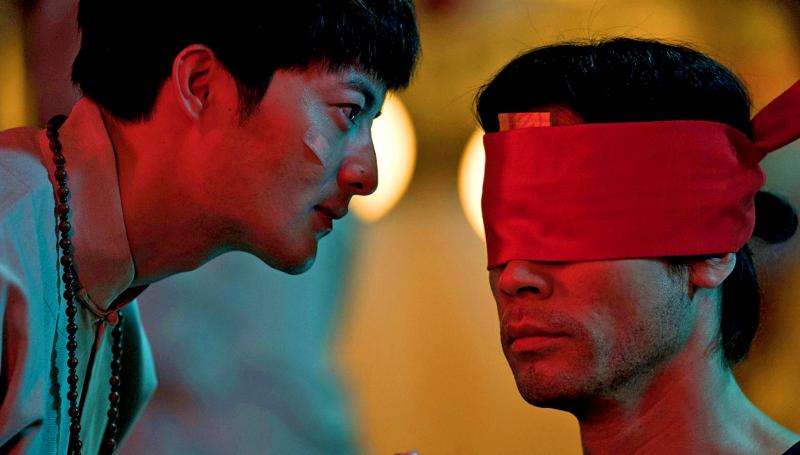It seems that even the filmmakers don’t know what happened in 49 Days (驚夢49天). After spending too much of the film building up the mystery and constantly introducing confusing elements, they wrap up the film in the last couple of minutes in the laziest way, with the protagonist actually uttering “nobody knows.” That is bloody annoying, having sat through over 90 minutes of disjointed and head-scratching storytelling.
Billed as a horror flick featuring the chilling Taoist ritual of guanluoyin (觀落陰), or visiting hell, 49 Days was meant to scare the pants off viewers over Dragon Boat Festival weekend. Horror movies don’t always need to make perfect sense, but 49 Days wasn’t frightening at all, even lacking a single good jump scare.
As a result, the film seems more like a drawn-out cop drama with supernatural elements. And the long-awaited guanluoyin ritual ends up mostly as a gimmick.

Photo courtesy of Creative Century Entertainment
The story revolves around successful executive Daniel (Lewis Liu, 劉國雄) whose life falls apart after having recurring nightmares of a woman in a red dress. After the first nightmare, the number 49 appears on his arm and counts down each day, representing the 49-day mourning period for the dead in Taiwanese culture. He soon becomes the prime suspect in a murder investigation, and his quest for the truth unearths secrets from his past. He’s aided by detective Yi-zhen (Lorene Jen, 任容萱), who also has her own trauma.
FOLK LEGENDS
Ever since The Tag-along (紅衣小女孩) became a sensation in 2015, almost every subsequent local horror production has involved Taiwanese folk legends and practices. The guanluoyin ritual is performed on people who want to visit a dead relative in the spirit world. While it does make sense to apply it to a murder mystery, the producers missed the opportunity to delve deeper into the fascinating yet harrowing ritual that many Taiwanese would be terrified to even consider trying.

Photo courtesy of Creative Century Entertainment
There’s little context and background, it’s just abruptly thrown in there as a way to revive Liu’s memories along with other forms of hypnotism. Likewise, the 49-day countdown that appears on Liu’s arm also seems to be a device to further the plot instead of holding any significance.
Nevertheless, there are a lot of promising ideas and elements in the film, even addressing sexual abuse of vulnerable young girls and women, and the storyline and settings are more ambitious than the standard Taiwanese horror flick. But that also means the filmmakers have more to explain and tie up. A lot of the storyline could have been cut out, as the pacing is bogged down by many unexplained details; it would have been better to use that time to flesh out the main plot.
Liu, who appears to be a Chinese actor based in the US, is an awkward fit for the role of protagonist Daniel. Touted as a Hollywood and Broadway veteran by the press, his only IMDb credit is this film, and little information can be found otherwise.
Liu’s background of someone who moved to the US as a youngster fits that of Daniel’s, but his Chinese accent and delivery in the film feels out of place, sounding almost like one of those Mandarin dubs for 1990s Hong Kong movies. It is even more inexplicable that the younger version of himself speaks Mandarin in a Taiwanese accent.
Technical details aside, Daniel is portrayed as a sullen, dark character even before the strange events begin, but Liu doesn’t exude enough charisma to pull off this type of anti-protagonist.
Jen has improved a lot since her pedestrian performance in last year’s Karma (玩命貼圖), playing the tortured but headstrong detective with conviction. But the two leads lack chemistry, and they just seem to be doing their own thing while occasionally converging despite sharing an emotional connection to the case. It’s extra disappointing because the ideas behind the film are very promising.
One final gripe: Taiwanese horror films need to get more creative with their ghosts. The long-haired woman wearing white or red gets old after a while.

In the next few months tough decisions will need to be made by the Taiwan People’s Party (TPP) and their pan-blue allies in the Chinese Nationalist Party (KMT). It will reveal just how real their alliance is with actual power at stake. Party founder Ko Wen-je (柯文哲) faced these tough questions, which we explored in part one of this series, “Ko Wen-je, the KMT’s prickly ally,” (Aug. 16, page 12). Ko was open to cooperation, but on his terms. He openly fretted about being “swallowed up” by the KMT, and was keenly aware of the experience of the People’s First Party

Aug. 25 to Aug. 31 Although Mr. Lin (林) had been married to his Japanese wife for a decade, their union was never legally recognized — and even their daughter was officially deemed illegitimate. During the first half of Japanese rule in Taiwan, only marriages between Japanese men and Taiwanese women were valid, unless the Taiwanese husband formally joined a Japanese household. In 1920, Lin took his frustrations directly to the Ministry of Home Affairs: “Since Japan took possession of Taiwan, we have obeyed the government’s directives and committed ourselves to breaking old Qing-era customs. Yet ... our marriages remain unrecognized,

Not long into Mistress Dispeller, a quietly jaw-dropping new documentary from director Elizabeth Lo, the film’s eponymous character lays out her thesis for ridding marriages of troublesome extra lovers. “When someone becomes a mistress,” she says, “it’s because they feel they don’t deserve complete love. She’s the one who needs our help the most.” Wang Zhenxi, a mistress dispeller based in north-central China’s Henan province, is one of a growing number of self-styled professionals who earn a living by intervening in people’s marriages — to “dispel” them of intruders. “I was looking for a love story set in China,” says Lo,

Standing on top of a small mountain, Kim Seung-ho gazes out over an expanse of paddy fields glowing in their autumn gold, the ripening grains swaying gently in the wind. In the distance, North Korea stretches beyond the horizon. “It’s so peaceful,” says the director of the DMZ Ecology Research Institute. “Over there, it used to be an artillery range, but since they stopped firing, the nature has become so beautiful.” The land before him is the demilitarized zone, or DMZ, a strip of land that runs across the Korean peninsula, dividing North and South Korea roughly along the 38th parallel north. This